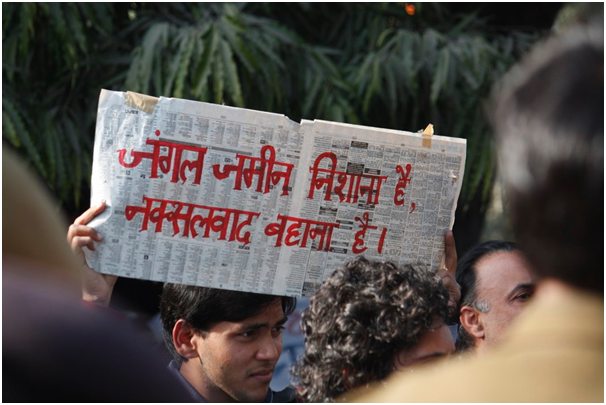Journalists Arrested or Made to Flee Chhattisgarh, Branded as "Maoists" By Cops Invoking Nationalism

NEW DELHI: “Your reporting is highly prejudiced and biased. There is no point in wasting my time in journalists like you. I have a nationalist and patriotic section of media and press which staunchly supports me. I would rather spend time with them.” This is the message sent to a journalist working for the BBC Hindi Service Alok Prakash Putul in Chhattisgarh, by the Inspector General of Police S.P Kalluri ,
And then a second message, this time from the Superintendent of Police, Bastar Narayan Das: “Hi Alok, I have lot of things to do for the cause of nation. I have no time for journalist like you who report in biased way. Do not wait for me.”
Subsequently. Putul who contacted senior journalists for help and finding little response, fled Bastar on February 20 after he received threats, and local residents warned him of his safety. Two days before this another Bastar based journalist Malini Subramaniam who was writing on human rights from Bastar fled the state following harassment by the police and others. She was interrogated several times by the police and demonstrations by a body calling itself the Samajik Ekta Manch outside her house, with slogans being raised against her, threatening her with death. Subramaniam has moved out of the state for fear of her life.
Two journalists Santosh Yadav and Somaru Nag, also based in Bastar, were arrested last year by the Chhatitsgarh police that accused them of Naxal links. They are still in jail, Yadav was reporting for several Hindi newspapers including Dainik Navbharat and Dainik Chhattisgarh was accused by the police of taking part in an encounter against the security forces for which 18 villagers had already been arrested. He has been booked under the Chhattisgarh Jan Suraksha Adhiniyam, and the Unlawful Activities (Prevention) Act. Here too SP Yadav told the media that he did not consider Santosh Yadav to be a journalist, and that he had Maoist links.
The New York based Committee to Protect Journalists has now issued a strong statement expressing deep concern about the “deteriorating climate for the press” in Chhattisgarh. It has called on the “authorities to ensure that journalists can work there without fear of intimidation.” The international journalists body has written at length about Putul and Subramaniam who “have fled the district of Bastar out of concern for their safety, and lawyers defending imprisoned journalists have been evicted from their offices.”
BBC Hindi service has carried details of the police harassment of Putul and he himself has detailed this in an account carried by its website. "Recent threats and harassment of journalists covering Chhattisgarh, and those defending them, risk producing an information vacuum in an area where the press is already under tremendous pressure," said CPJ's Asia program senior research associate, Sumit Galhotra. "Authorities have a responsibility to protect journalists and ensure they can do their work without fear of reprisal."
Putul had written about the pressure being exerted by the police on the lawyers representing the imprisoned journalists. The lawyers were also branded by the police as Maoist supporters. The legal team was evicted by the landlord who came under pressure from the police The police, of course, have predictably denied this.
“Reporting from Chhattisgarh poses serious challenges: According to CPJ research, police often pressure, harass, or abuse journalists in an effort to silence critical reporting or to compel them to serve as informants. Meanwhile Maoists have attacked journalists they accuse of being informants for police, CPJ has found” according to its statement. CPJ has also written to Chhattisgarh Chief Minister Raman Singh sent on January 19, asking him to ensure a safer working environment for journalists in the state but there has been no response.
(Photograph: Protest against arrest of Chhattisgarh journalists)



